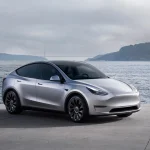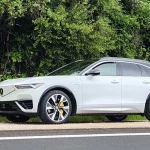
IRS Electric-Car Tax Credits: Reporting Discrepancies RemainIRS Electric-Car Tax Credits: Reporting Discrepancies Remain
As U.S. taxpayers start to grapple with their income-tax filings, due April 15, tens of thousands of taxpayers will benefit from a Federal income-tax credit of $2,500 to $7,500 offered to buyers of plug-in electric cars.
Enacted in 2009, it was intended to spur the early sales of such cars whose prices remain higher than those of their gasoline equivalents.
DON’T MISS: White House Budget Asks For $10K Electric-Car Credit, Natural-Gas Cars Added
With more than 285,000 battery-electric and plug-in hybrid cars on U.S. roads today, that credit likely helped cut the cost of a majority of them.
2014 Chevrolet Volt
But the credit starts to sunset for each carmaker when it reaches a total of 200,000 plug-in cars sold.
To help buyers understand how many vehicles remain eligible for the credit, the IRS offers a report showing the vehicles that qualify, and other one showing how many were sold for each maker.
As AutoblogGreen noted last September, that page had numerous problems with missing makers and strange totals. In many cases, it conflicted directly with publicly-available sales data for electric cars, which is widely reported here and by numerous other outlets.
Eligible vehicles: largely accurate
So has the situation improved? Is the IRS page any more accurate? The short answer is yes and no.
Autoblog’s piece was written on September 18, and the IRS page had then last been updated on September 2. It now shows the last update as of November 17, last year.
Manufacturers with vehicles eligible for plug-in electric vehicle purchase tax credit, IRS, Nov 2014
There are now 25 separate manufacturers listed, including both carmakers and those that sell medium- and heavy-duty commercial vehicles, on the qualifying vehicle list.
That list seems largely accurate, but there are still some oddities. The Honda page, for instance, lists only the Accord Plug-In Hybrid, but not the Fit EV (which has sold more than double the number).
And the Kia Soul EV, which went on sale in October, is not listed (although the Porsche Cayenne S E-Hybrid, which started sales only in November, is).
Number sold: still perplexing
The vehicle-sales total page, however, remains perplexing.
As Autoblog noted, this could be a problem of reporting on the carmaker side or challenges in keeping the page updated on the part of the IRS.
Sales of vehicles qualifying for plug-in electric car purchase tax credit, IRS, Nov 2014
But numerous concerns remain.
More than two dozen different models of plug-in passenger vehicles have now been sold since 2009 and are eligible for the credits. But only seven are listed as having been sold in 2014.
That’s up from the five reported by Autoblog, but it’s still missing data for every maker except for Ford, Mercedes-Benz, and Nissan.
Though as Autoblog author Sebastian Blanco points out, automakers must sign a disclosure waiver to let their reports to the IRS be published.
Which begs the question: Why would BMW, Fiat Chrysler, General Motors (Cadillac, Chevrolet), Honda, Mitsubishi, Toyota, and VW Group (Porsche, Volkswagen) not want the IRS to disclose their data?
A rough scan of the Nissan sales totals shows that they are lower than the total reported deliveries of the same cars, which makes sense: Not every buyer is able to claim the tax credit.
Paperwork
More credits than sales?
The most glaring oddity, however, is the total sales reported for the three qualifying Ford products: the Focus Electric, C-Max Energi, and Fusion Energi.
In 2012, the IRS shows 4,101 of those vehicles cumulatively sold. Yet Ford’s own reports say it delivered 2,374 C-Max Energis and 685 Focus Electrics that year, for a total of 3,059.
The 2013 total of 20,409 Fords similarly exceeds Ford’s reported total of 14,981, made up of 7,154 C-Max Energis, 6,089 Fusion Energis, and 1,738 Focus Electrics.
We might suggest that the IRS may wish to do two things: First, contact Ford to ask about those apparent discrepancies, and second, confirm that none of the other seven automakers whose totals are not shown won’t give permission.
It may be that the data exists within the vast IRS apparatus, and this is just a lag in posting it publicly–which as online publishers we have some sympathy for.
Nevertheless, over to you IRS–and Ford too, for that matter.
_______________________________________________
Follow GreenCarReports on Facebook, Twitter, and Google+.
View original article at : “https://www.greencarreports.com//news/1096629_irs-electric-car-tax-credits-reporting-discrepancies-remain”
Add a comment Cancel reply
Categories
- Activism (1)
- Adventure (1)
- Advertising (2)
- Agriculture (1)
- Air pollution (4)
- Air transport (3)
- aluminium (2)
- Amazon (3)
- Animals (1)
- Apple (2)
- Architecture (1)
- Arctic (1)
- Artificial intelligence (1)
- Augmented Reality (1)
- Auto Detailing (1)
- autopilot (1)
- battery (31)
- Best summer holiday destinations 2022 (1)
- Bicycle (1)
- biodiversity (1)
- BMW (2)
- boat (1)
- Bus (1)
- Business (4)
- Buying Guides (1)
- car (7)
- Car industry (18)
- Car News (18)
- car rental (3)
- Car Reviews (4)
- Car sales (6)
- carbon emissions (15)
- carbon footprint (3)
- Carlos Ghosn (1)
- Cars (66)
- Central Europe (1)
- CES (2)
- charging station (11)
- Children (1)
- China (12)
- Citroën (1)
- city (1)
- City transport network (2)
- clean energy (2)
- Climate (1)
- climate change (9)
- Climate crisis (4)
- Climate emergency (2)
- climate protection (2)
- CO2 emissions (39)
- Company (3)
- Competition (1)
- Conscious travel (2)
- Contamination of water (1)
- Copper (2)
- cost of living (2)
- Cuba (1)
- Cuban politics (1)
- Cybertruck (1)
- Cycling (1)
- deforestation (1)
- delivery (3)
- Denmark (2)
- Detroit (1)
- Diesel (4)
- Diesel car (7)
- e-mobility (11)
- e-scooter (2)
- Eco travel (3)
- Eco-friendly (2)
- Ecology (1)
- Economy (1)
- El Niño (1)
- Electric (11,302)
- Electric boats (1)
- electric car (107)
- Electric Cars (499)
- Electricity (5)
- Electricity consumption (3)
- Electricity market (5)
- Elon Musk (21)
- emission (1)
- Emmanuel Macron (1)
- Energy (2)
- Energy low cost (1)
- energy transition (6)
- Entrepreneur (1)
- Environment (5)
- Environment pollution (1)
- Environmental protection (4)
- EU Policy (1)
- EU-China (2)
- Europe (7)
- Europe's energy crisis (1)
- European Commission (3)
- European economy (2)
- European Union (18)
- Euroviews (6)
- Eviction (1)
- EVs (37)
- F1 (1)
- factory (4)
- fake news (1)
- family (2)
- Ferrari (1)
- fertilizer (1)
- fine (penalty) (1)
- fire station service (1)
- flight (1)
- Flying car (4)
- Food security (1)
- Ford (1)
- Formula 1 (2)
- Fossil fuels (14)
- France (39)
- free trade (1)
- Fuel (3)
- Fuel cell electric vehicles FCEV (10)
- fuel crisis (2)
- Fuel Efficiency (3)
- fuel prices (1)
- Funeral (1)
- Gas (1)
- Gas Prices (1)
- gasoline price hike (1)
- German (1)
- Germany (8)
- Giorgia Meloni (1)
- Global warming and climate change (1)
- Good News (1)
- Greece (1)
- green energy (1)
- green new deal (1)
- Green transportation (17)
- Green Week (1)
- greenhouse gas emissions (6)
- Hanoi (19)
- Health (1)
- home (2)
- homelessness (1)
- Housing market (19)
- human rights abuse (1)
- Hybrid (2,283)
- Hybrids (116)
- Hydrogen (2)
- hydrogen vehicle (2)
- IAA Mobility (2)
- Iceland (3)
- incident (1)
- income (1)
- India (2)
- Indonesia (1)
- infrastructure (1)
- innovation (1)
- International relations (1)
- Investment (4)
- iPhone (1)
- Japan (1)
- Jobs (3)
- Joe Biden (4)
- Jubilee (1)
- Lampedusa (1)
- Las Vegas (1)
- lead petrol (2)
- Lithium (13)
- liveable cities (2)
- London (3)
- Luxembourg (1)
- Luxury (2)
- luxury goods (2)
- Luxury lifestyle (2)
- Manufacturing (5)
- Market (1)
- Markets (1)
- meat (1)
- Mercedes-Benz (39)
- Migrants (1)
- minerals (2)
- Mining (5)
- Mitsubishi Motors (1)
- Mobile World Congress (1)
- Mobility (10)
- Mobility Week (2)
- Mobility Week 2021 (1)
- Mobility Week 2023 (5)
- money (3)
- Motorcycling (2)
- Motorsport (1)
- Mountain (1)
- NASA (1)
- nature (2)
- net-zero (2)
- New technologies (6)
- Next Explainers (1)
- Next In data (2)
- Nigeria (1)
- Nissan (3)
- Norway (7)
- Nuclear Energy (1)
- nuclear fusion (1)
- Nuclear power plant (1)
- Odd (1)
- oil industry (1)
- Olaf Scholz (1)
- online shopping (1)
- Oslo (1)
- Paris (1)
- parody (1)
- Petroleum products (3)
- Peugeot (1)
- plastic (1)
- Poland (1)
- Politics (1)
- Pollution (44)
- Power Plant (1)
- prices (1)
- production (1)
- Profits (1)
- Prostitution (1)
- Public transport (4)
- Racing cars (1)
- Racism (1)
- Rail transport (2)
- rats (1)
- Raw material (1)
- Recycling (4)
- Renault (3)
- Renewable energies (6)
- renewable energy (6)
- Reykjavík (1)
- Rishi Sunak (1)
- road (36)
- Road infrastructures (1)
- Road safety (7)
- Road transport (20)
- road trip (1)
- Robot (1)
- Rolls Royce (1)
- Russia (1)
- Russia's invasion of Ukraine (2)
- Sadiq Khan (1)
- safari (1)
- Safety (1)
- Sale (1)
- sales (3)
- Scotland (1)
- self-driving (43)
- Semiconductor (1)
- Shares (1)
- Show (1)
- Silicone (1)
- Software (1)
- Solar energy (2)
- solar power (5)
- Space technology (1)
- Spain (1)
- start-up (3)
- Stock exchange transaction (1)
- Stock market activity (1)
- Stockholm (1)
- Strasbourg (1)
- Students (1)
- Summer Olympics (2)
- Sustainability (7)
- Sustainable city (3)
- Sustainable design (3)
- Sustainable development (1)
- Sustainable innovation (9)
- Sustainable technology (21)
- Sustainable tourism (4)
- Sweden (2)
- Tata Motors (2)
- Tax (37)
- Taxes (2)
- Taxi (1)
- Technology (55)
- Tesla (73)
- The Boring company (1)
- Tokyo Olympic Games 2020 (1)
- Toyota (4)
- trade (3)
- traffic (1)
- Trains (2)
- Transport (11)
- transportation (3)
- Travel destinations (1)
- Tunnel (1)
- Twitter (3)
- UBER (1)
- Ukraine war (1)
- Uncategorized (6)
- United Kingdom (5)
- United States (6)
- urban planning (2)
- Ursula von der Leyen (3)
- US politics (1)
- USA (1)
- vegan (1)
- vehicle (7)
- Video (4)
- Vietnam (19)
- Volkswagen (3)
- Volvo (2)
- waste (1)
- waste disposal (1)
- Water (1)
- Water resources (1)
- White House (1)
- wind energy (1)
- Wind turbine (1)
- Winter (2)
- work conditions (1)
- World Travel Market (1)
- Xiaomi (1)
Recent Posts
About us

Popular Tags
Related posts


Volvo EX30 in the test: Really a premium car at a volume price?

VW ID.7: Estate is not called Variant... It's a Tourer







